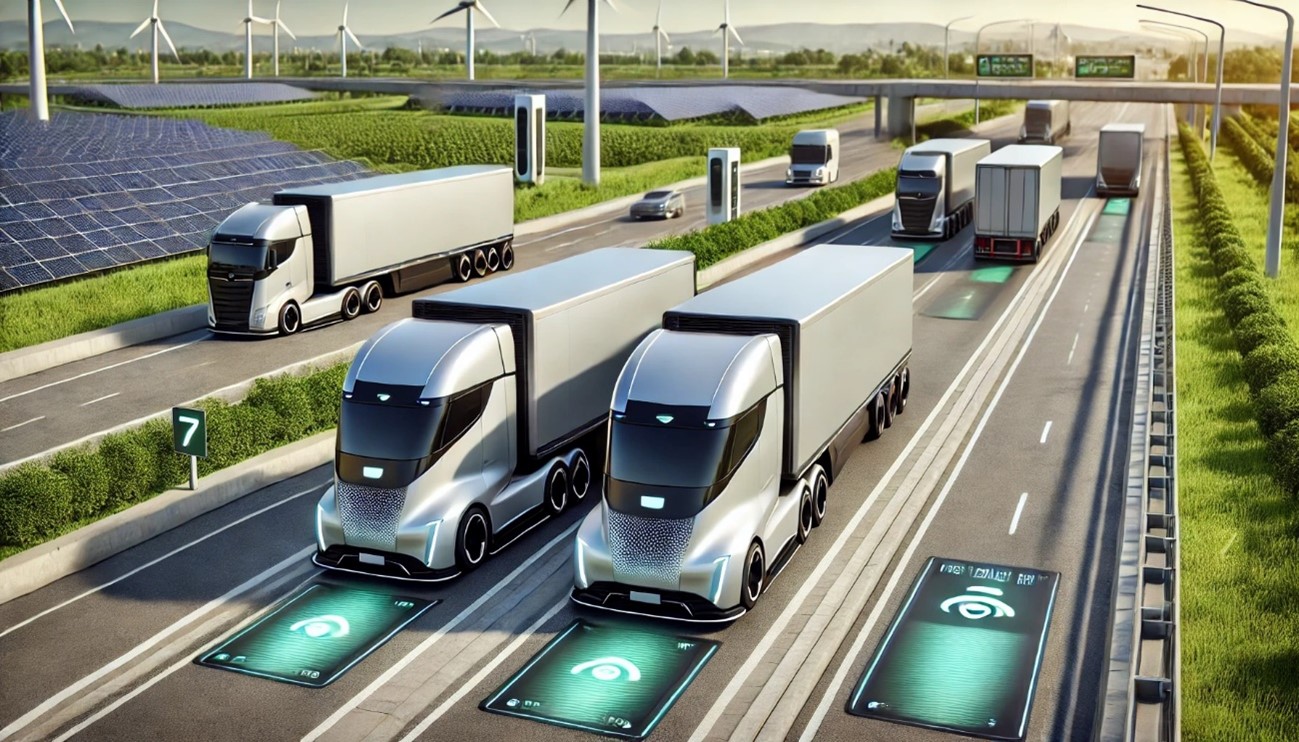How Innovative Technologies and Regulations are Steering the Logistics Industry Towards a Greener Future
15/01/2025, Aveiro, Portugal
As logistics continues to evolve under the pressures of climate change and sustainability mandates, two key factors are driving significant change in the industry: autonomous vehicles and government regulations. These innovations are not only redefining how goods are transported but are also setting the stage for a future where the logistics industry operates in a greener, more efficient manner. As global demand for eco-friendly solutions intensifies, these breakthroughs represent crucial steps toward achieving sustainable logistics at scale.
Autonomous Vehicles: A Game Changer for Green Logistics
The development of autonomous vehicles (AVs), particularly in the freight and delivery sectors, has been one of the most talked-about advancements in sustainable logistics. Self-driving vehicles, equipped with cutting-edge sensors and artificial intelligence, promise to revolutionize how goods are moved globally, while significantly reducing the carbon footprint.
- Energy Efficiency: AVs can optimize their routes in real-time, reduce fuel consumption, and minimize unnecessary emissions. By operating at optimal speeds and reducing idling, these vehicles enhance fuel efficiency, particularly in long-haul freight.
- Electric Trucks and Drones: The combination of autonomous and electric technologies offers the ideal solution for a cleaner and greener logistics network. Companies like Tesla, Nikola, and Rivian are making strides in electric trucks, while autonomous drones are already being tested for last-mile delivery, offering the potential for zero-emission deliveries.
- Safety and Reduction of Accidents: Autonomous vehicles could also reduce accidents caused by human error, which can lead to resource wastage and vehicle damage. Safer roads translate to fewer accidents and less congestion, ultimately reducing the environmental impact of logistics operations.
By reducing operational costs, improving fuel efficiency, and cutting emissions, autonomous and electric vehicles are paving the way for more sustainable logistics.
Government Regulations: Policy Driving Green Logistics
While technology leads the way, government regulations are crucial in accelerating the shift to green logistics. Across the globe, regulatory frameworks are evolving, pushing companies to embrace more sustainable practices, both in transportation and warehouse management.
- Carbon Emission Targets: Many countries have set ambitious carbon-neutral goals, creating stringent standards for emissions from logistics companies. The European Union, for example, has set clear targets under the European Green Deal, which aims to achieve net-zero emissions by 2050. This includes strict regulations on freight and transport emissions, promoting the adoption of sustainable technologies such as electric vehicles and renewable energy-powered warehouses.
- Incentives for Green Logistics Investments: Governments are also offering incentives for businesses to invest in green technologies. Tax credits, subsidies, and grants for companies adopting sustainable logistics solutions, such as electric trucks and solar-powered warehouses, have become increasingly common. These incentives not only lower the initial investment costs but also speed up the widespread adoption of green logistics technologies.
- Green Logistics Zones and Infrastructure: Countries like China, the United States, and members of the European Union are creating Green Logistics Zones with infrastructure designed to facilitate cleaner logistics operations. This includes EV charging stations, low-emission zones in urban areas, and enhanced rail transport networks that reduce reliance on carbon-heavy road transport.
The increasing number of regulations is making sustainability not just an option but a necessity for logistics companies to remain competitive in the marketplace.
Bridging the Gap: How Industry and Policy Will Work Together
The collaboration between private-sector innovation and public policy is essential for the successful implementation of sustainable logistics practices. While technologies like autonomous vehicles will play a pivotal role in reducing the logistics sector's environmental impact, policies and regulations will ensure that these innovations are adopted more rapidly and in a way that maximizes their benefits.
- Public-Private Partnerships: Governments and companies need to work together to create shared infrastructures, such as charging stations and autonomous vehicle-friendly roads, to support the transition to green logistics.
- Global Standards: The adoption of universal standards for electric vehicles, autonomous delivery drones, and carbon emissions will help streamline the global logistics network, ensuring consistency across borders and markets. Efforts such as the International Maritime Organization’s (IMO) decarbonization agenda are prime examples of global efforts aligning policy with green logistics.
In conclusion, the future of logistics is being shaped by technological advancements like autonomous and electric vehicles, combined with the increasing pressure from government policies to reduce emissions and enhance sustainability. The collaboration between innovative logistics companies and supportive regulatory frameworks will not only drive the sector toward a greener future but will also accelerate the shift to net-zero emissions globally. As the industry continues to embrace these changes, the logistics sector is setting a new standard for sustainability, efficiency, and innovation.

Source: ChatGPT
